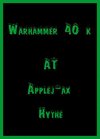It’s been a while since anything appeared here, I think the last time I posted an entry was it was related to a rather dismal days gaming that centred around losing to Tyranids, well since then I’ve lost to the little buggers again, although I have had a win against Dark Eldar so it’s not all bad. Over the last few weeks I’ve been trying to work out what I can do to improve my game, I’ve taken into consideration the unit choices I make, the way I deploy those units on the table, the way the units are equipped and I’ve realised where the problem lies. its not my choice of unit or wargear, it’s not my tactics, it’s my dice!
I know the old saying is that a poor workman always blames his tools but in the case of the gamer it’s extremely rare that we get a perfect run of luck and our dice rolls are exactly what we need and our adversaries are exactly what they don’t need. All too often I have been willing my opponent to roll badly, do I feel bad about it? Heck no! Those pesky little plastic cubes can mean all the difference between win or lose, succeed or fail, and although I will not stoop to outright cheating, well not so much anymore, I will do what I can to ensure my dice roll well. If that means bribing someone or sacrificing someone something then I probably would. I admit that I have, on the odd occasion, been somewhat dishonest about the results of a dice roll, usually when the odds are stacked against me and that result could spell total disaster for the game. Oddly most of these times have been when playing an RPG rather that on the table top, but none the less something has stirred within me to bring to this confession. I know it’s a small thing, but I blame the dice entirely. We’ve all been there as gamers, that time when you absolutely need to roll a four or better and you roll a three, the ref doesn’t actually see your roll so the three becomes a five. Why five? the logic behind that choice is this: you need to roll a four or higher to prevent certain death for you PC, a six would be a little too obvious that you fudged the roll and aren’t being entirely honest, the same goes for a four, needed a minimum roll of four and getting a four would appear suspicious if not actually witnessed, as a ref I would doubt the validity of the roll unless I saw the die leave the players hand, so five would be the best result to call as it’s not too high or too low. it’s the same as rolling a 19 or 20 on a D20, during one evening of AD&D we had one chap in our group roll seven consecutive 20s, the odds on that are beyond my ability to calculate, but I know how unlikely that is. I was so wary of the rolls that when the player left the room I checked the die to see if it was loaded, that sort of thing isn’t just limited to Vegas you know, surprisingly the die wasn’t loaded, I was rather shocked to say the least.
Most of the gamers I know, whilst fitting the stereotype in some from or another, aren’t particularly superstitious except where dice are concern, and I’ve seen some genuinely out there methods for trying to coerce dice into behaving themselves. Almost everyone I’ve gamed with has been a little odd about their dice, from the sublime right through to the absolutely ridiculous. We had a player who would wash his dice in the local river after each nights gaming, another chap would place his dice on the table in a particular pattern, he’s get seriously miffed if we messed with them. I know at least two dice killers, the type that you absolutely forbid them touching your dice, you don’t even let them pick up the bag the dice are kept in because you know that if they do they will never roll well again, Then there’s the player who can roll a die and before it finishes rolling he tells you what the result will be and is right 95% of the time, you know who you are!
So what about when it all goes wrong? When that moment arises when you roll six dice and you need a two or better on just one and they all roll ones, is such an event purely down to chance? Or is there some controlling factor that kicks in just to frustrate you and make you look like you’ve been kicked somewhere that you really don’t want to be kicked? Of course there is, ask any serious gamer and they will tell you that dice rolls are not random, they’re not the result of pure chance, there is a power that governs those small plastic cubes and it’s evil! At the risk of being hung drawn and quarter by the girly types I’d go so far as to say that the force that resides inside each and every die on the planet is female. Dice rolls aren’t pure chance, its mood swings, I swear that if I offered to buy my dice shoes, handbags and chocolate they’d roll well every time.
I suspect that the non-gamers that read this, or those folk whose only experience of dice is Monopoly or Cluedo are probably thinking I’m totally bonkers, but spend an evening with a group of gamers and your eyes will be opened. So the next time you are about to put your faith in the result of a random roll of the dice, don’t blow on them or kiss them, just say a little prayer to the goddess Randomonia and hope that she’s listening and not browsing the shoes on E-bay.




